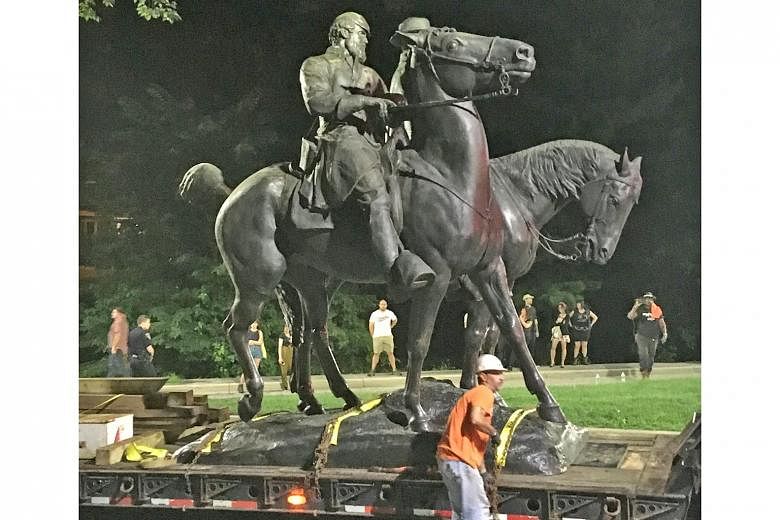BALTIMORE • All across the United States, mayors, governors and civic leaders are trying to figure out how to avoid becoming the next Charlottesville.
They are also grappling with what to do about their cities' Confederate monuments that stand as symbols of the pro-slavery Civil War South, an issue that has suddenly become much more urgent.
Four such monuments in Baltimore, Maryland, were hauled away in the early morning on Wednesday, and one in Birmingham, Alabama, was covered in plywood.
Violence is at the centre of the concerns, and the rally in Charlottesville, Virginia, showed law enforcement authorities that they need to be better prepared.
Mr Darrel Stephens, executive director of the Major Cities Chiefs Association, noted that many of the people who came to Charlottesville wore helmets and carried shields.
"These guys, the shields that they showed up with... you don't bring that stuff to a demonstration to just express a view," he said. "You bring that there prepared for violence. Why else would you have them?"
To head off potentially violent rallies, Baltimore Mayor Catherine Pugh stayed up on Tuesday night into Wednesday morning to observe contract workers hauling away four Confederate monuments. She said she told herself: "There are enough grandstanding speeches being made. Get it done."
Only an empty pedestal remained where the figures of Confederate generals Robert E. Lee and Thomas J. "Stonewall" Jackson had been astride their war horses.
"If they choose to take those statues down, fine. Maybe it's appropriate to have them in museums or to put them in some sort of historical context in that regard," said Mr Robert E. Lee V, great-great-grandson of General Lee
President Donald Trump said on Twitter yesterday that he was "sad" to see US history torn apart by the removal of "our beautiful statues and monuments".
Cities are worried they could become flashpoints for public actions they have taken on behalf of their citizens.
A working group of the Lexington-Fayette Urban County Council in Kentucky voted unanimously on Tuesday to move Confederate statues from their locations at the old county courthouse.
Unappeased, a white supremacist group is planning a rally there "sooner rather than later".
WASHINGTON POST, NYTIMES

